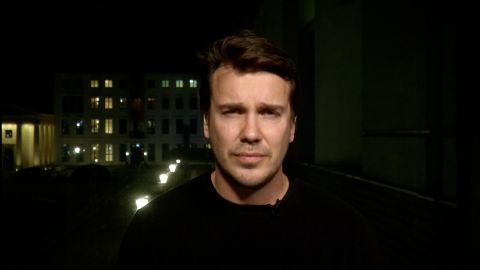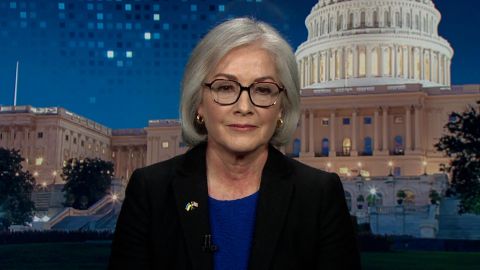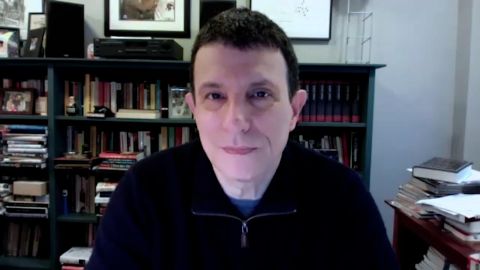Read Transcript EXPAND
CHRISTIANE AMANPOUR: Now, the young KGB officer Vladimir Putin took the collapse of the Soviet Union as a personal humiliation. It is illuminating to hear how he identifies now as the one to redeem what he sees as a lost glory. Pulitzer prize-winning author and editor of “The New Yorker” magazine, David Remnick, joins Walter Isaacson to explore Putin’s past.
(BEGIN VIDEOTAPE)
WALTER ISAACSON: Thank you, Christiane. And, David Remnick, welcome to the show.
DAVID REMNICK, EDITOR, THE NEW YORKER: Good to be here, Walter.
ISAACSON: You were a bureau chief in Moscow for “The Washington Post” in the late 1980s and early 1990s. When Russia was going through this openness with Gorbachev and then Yeltsin, you won the Pulitzer Prize for that great book, “Lenin’s Tomb.” What happened? Why have we regressed to an authoritarian regime?
REMNICK: Well, it’s literally a long history. Russia has been under authoritarian rule for a millennium and communist rule for seven decades. The Gorbachev moment was an interregnum of great promise. Much talk of democracy, even democratization. And the ’90s were incredibly chaotic. And we know the history of that. So, we shouldn’t underestimate the power of the historical tug toward what you now see is Putinism. Really, what is Putinism? Putin was installed by Boris Yeltsin at the beginning of the 21st century. And very quickly, very rapidly, certainly within a couple of years, he became the standard bearer of Russian resentment toward the West, toward Europe for a whole host of reasons. Remember, Walter, that he viewed the collapse of the Soviet Union not as the liberation of Ukraine and Azerbaijan and Armenia and the Baltic States or the possibility of a democratic promise or any of those things. He viewed it as the greatest geopolitical catastrophe of the 20th century, his words, not mine. And as time has gone by, his resentment toward the West has deepened and deepened. And we have seen instances quite quickly also of his ability to use violence and revenge and fury exacting upon its own people, in (INAUDIBLE). That’s the way power began with Putin. So, it’s just gotten worse and worse and worse. And people are — some people are only wakening to it now.
ISAACSON: So, in other words, we should have known at the beginning Putin was going to be this way or has he changed radically?
REMNICK: Well, I don’t think Putin was ever a great — somebody who felt that Gorbachev was on the right track. He’s always felt that Gorbachev was a fool and weak and a play thing of the West. You know, he comes from a certain background. Maybe it’s useful to go through that. He comes from Leningrad. You know, his father went through the war and — in the most horrendous and yet typical way. He entered the KGB. He was not in the elite strata of the KGB by any stretch of the imagination. And he experienced the fall of the Soviet Union while being a kind of mid-level lieutenant colonel in East Germany. And he experienced the collapse of the Soviet Union as the absence of power, as a humiliation, not as a moment of promise. You know, he saw what was happening in Germany as a catastrophe. And so, and he comes out of the KGB. Walter, I — you know, I can’t emphasize enough how the KGB as an institution and a network didn’t disappear with the end of the Soviet Union. In fact, it took advantage of it in many ways. It became in large measure part of the elite. It took advantage of it in business. And never more so than under Putin.
ISAACSON: Was he most provoked by the expansion of NATO or is he worried about liberal democracies rising on his borders or is this just clinging to power?
REMNICK: All of the above. All of the above. You know, Putin changed the constitution not long ago so that he basically will be in until the end of his days. Be into the end of his days. NATO has been a debate and a point of real contention with the Russians from the very moment of the collapse of Soviet Union, if not before. You remember, this is happening during the George H.W. Bush administration, and there’s a long history of that. But I think, you know, as Ukraine is concerned, Ukraine has been independent since 1991, since the collapse of the Soviet Union. And Putin has never accepted that. And more and more, he has delved into esoterica of 19th century Russian nationalist texts to derive a sense that — of the great Russia, which is Russia, white Russia, which is Belarus, and Mollerussa (ph), the small Russia, which is Ukraine. That’s 19th century nationalist language. He believes it. He believes Ukraine is not a country and he believes Ukrainians are not a people. And what you are seeing with this invasion is an attempt to bring Ukraine as a nation and Ukrainianness to its knees through the complete step by step annihilation of the civilian population, by — through terror. That’s what’s going on.
ISAACSON: Do you think that NATO should have expanded to include Ukraine?
REMNICK: No. You know, clearly, you know, Ukrainians now feel that that might have been a good move. But I think, right now, I don’t think that is very much in the discussion. Look, I want any number of things to happen at once. I would want the war to end. Above all, you want to see the suffering end. But look at the — listen to the Ukrainians. Watch what Ukrainians are doing. They are putting everything on the line to defend their nation, their Ukrainianness and to fail to be moved by that and persuaded by that and to have to discount that into your thinking, I think, is something extremely odd and mistaken. You are seeing Ukrainians putting themselves in harm’s way in the most extreme and moving and astonishing ways. And I think we have to take that very, very seriously. Do I think a no-fly zone is a good idea and recklessly engaging Russia in a war? No, I do not. No, I do not. Do I think there are easy ways out of this? No, I don’t. I wish there was some easy, you know, answer. Anybody suggesting an easy answer, an easy resolution to this, considering who is in the driver’s seat, who is exacting the punishment here, Vladimir Putin, I think is deluded.
ISAACSON: Do you think Ukraine can actually win this war and that’s a resolution of this?
REMNICK: Well, what constitutes winning? Does constitute winning that the Russians, all of a sudden, on Wednesday retreat and the tanks head back to — head north toward Moscow? That’s hard to imagine considering the sheer preponderance of armaments that they have. But I think what we have seen now in three weeks of fighting is that a vastly outmanned Ukrainian army and defense force among the civilian population that has far, far fewer armaments have fended off what Putin had hoped to be a blitzkrieg, a decapitation of Ukrainian power. Probably the arrest, if not worse, of Zelenskyy and his aides and other officers of the — elected officers of the Ukrainian government. He had hoped and probably been told by the defense minister Shoigu that that was possible within a week. So, the Ukrainians have pulled off, in military terms, if not even in spiritual national terms a kind of miracle. And even if they lose in a most conventional sense, even if Kyiv is “taken,” it is almost a certainty that what would commence from there is an insurgency. This is an enormous country, Walter. I know very few people — or not a lot of people are completely familiar with it in detail. This is a country of 45 million people. It’s an enormous space in Europe. It’s a complex country from East to West. And taking it, you know, in a matter of days or even taking it at all is not a simple matter, as Putin is finding out to his pain. And at the same time, he has to deal with potential unrest or uprising from two directions. First is the street and second, probably more consequentially, in his own house. So, he is trying to deal with the street by complete information cone, by trying to fend off the internet, independent press and all the rest. Now, that’s only partially effective and might get less effective as time goes by. How is he dealing with people around him? Well, he’s got a bunch of loyalists who are not of the top ranks sometimes, because that’s what happens in authoritarianisms, you don’t pick the best and brightest. You pick the most loyal and sometimes the dumbest. Will they rise up against Putin? Will they see this as a catastrophe that they can’t bear or countenance? I think that’s what U.S. intelligence is studying every single day.
ISAACSON: Do you think sanction will work and cause real pain in Russia?
REMNICK: They already have caused a lot of pain. The question is, have they caused the pain to the right people and has it happened rapidly enough? You know, we hear a lot of talk on television and in the press about the oligarchs. And that bears clarifying. It’s — that term was used during the Yeltsin years to define about seven to nine people who got into business with the Putin — excuse me, with the Yeltsin government and were given essentially given or given unbelievable great preferential deals on certain huge and influential businesses. And they had enormous influence on Yeltsin. I’m talking about (INAUDIBLE), Gusinsky, Khodorkovsky and so on and so forth. That picture changed enormously when Putin came to power. When Putin came to power, he told those nine people or a dozen people or whatever it was, you are not allowed in politics anymore. If you want to keep your own gotten gains, fine. Stay out of politics.
ISAACSON: Tell me about “The New Yorker.” It has the most astonishing coverage. How difficult is it for your reporters who are there?
REMNICK: Well, it’s difficult for all reporters. We have Joshua Yaffa who is based in Moscow but who is no longer in Moscow. He just spent a month in Ukraine and wrote an astonishing long piece that’s out this week. But like so many reporters, he’s had to leave because it’s now illegal — try on this or really in a sentence, it’s illegal to write the truth about the war, whether you are Russian or not. Masha Gessen has been in Ukraine and has been in Moscow and now, is, again, out of Moscow because, you know, the same reasons. And we have other people coming through. And Luke Mogelson is a war reporter. Ed Caesar has been working on refugees. We have all kinds of people who were reporting on this. You know, just extraordinarily complex and horrific complex events.
ISAACSON: A couple of them have been on our show. Tell me how they’re trying to get through the disinformation and censorship.
REMNICK: Well, they pick up the phone. They talk to people. I mean, nobody is censoring us. I mean, we are blessed by a freedom of the press and ownership of “The New Yorker” that allows us to publish what we want. The censorship issue is — has to do with the ability to have reporters in Moscow, in Russia and sending dispatches out. I mean, you have seen “The New York Times” bureau, which is, you know, a much bigger and more complex animal. That’s disbanded. And CNN, I think, a lot of — so far as I know, all of them, BBC, it’s terrifying. And, you know, it’s an indication of what Russians already do, those who are in the know, fear for the future of Russia, which is that Russia will become cut off from the world. You know, the old metaphor was the iron curtain. I don’t know what the new metaphor would be. But it’s hard to imagine in the age of the internet and modern communications that that can be anything like it was. But, you know, Russia was, in many ways — in limited ways and with all the caveats about the authoritarian of the state, in some ways, was joining the world, right? In business terms, Russians traveled much, much more widely in the post-Soviet era than before, people — you know, middle-class people going to Turkey or Greece on cheap flights. This became part of life. Again, I’m not talking about oligarch. You know, more and more students abroad. People joining the world. Will this, with this horrific war, end? Now, that’s a big concern for a lot of Russians. And I would say tens of thousands of Russians have left in the last three weeks. And now, find themselves living in Azerbaijan, Armenia, Turkey and all the rest, and they feel they are stranded.
ISAACSON: In “Lenin’s Tomb” you have a sentence that I find memorable, which was, once the system showed itself for what it was and had been, it was doomed. Is Putinism doomed?
REMNICK: Well, that sentence was written because it tried to get at a larger truth. One of the things that Mikhail Gorbachev as general secretary of the communist party and then, his president, was to come to the conclusion, without a real reckoning of the truth, without coming forward and saying, this is our history for all its complexities and tragedies and barbarities too, this is our present for all its faults, without reckoning with that, we can never modernize, we can never move forward, we cannot live in an (INAUDIBLE) present and we — and — because we will never achieve a decent future. That was his conclusion. He was right. God knows the United States is not perfect, not even remotely so, and we are reckoning with our past when we are honor with ourselves every day and should be, with our history of race or income and equality, whatever it is. Our history is something that we have to reckon with and deal with and all the rest. Putinism wants to know part of that. One of the things it did in the runup to the war in Ukraine is it shut down an organization called Memorial. Memorial, which studied the stone has past, which had, you know, opened up archives. My own — my wife, whose grandfather died in a camp in Russia, was able to get the archives through Memorial when it began many years ago. That’s just one detail in the way that Putin has increasingly moved on history and truth. Not in a way that resembles Stalin exactly, but in a modern way that has been extremely effective, unfortunately.
ISAACSON: David Remnick, thanks for joining us.
REMNICK: My pleasure, Walter.
About This Episode EXPAND
Journalist Mikhail Zygar discusses Russian citizens’ growing dissent against the war in Ukraine. Former U.S. Ambassador to Ukraine Marie Yovanovitch explains why she thinks “we need to do everything we can to help Ukraine.” The New Yorker’s David Remnick joins Walter Isaacson to explore Putin’s past.
LEARN MORE


